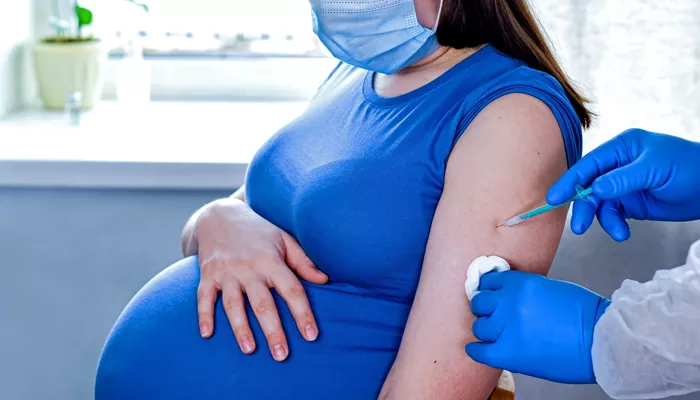Health and Human Services Secretary Robert F. Kennedy Jr.’s proposal to eliminate the government’s current recommendation for COVID-19 vaccination in healthy pregnant women would mark a major setback in decades of public health progress aimed at improving maternal and neonatal outcomes.
More than a scientific misstep, this proposal is profoundly unethical.
Pregnant individuals have long been overlooked in biomedical research and development, a systemic exclusion that jeopardizes both maternal and fetal health. In the years leading up to the COVID-19 pandemic, leading experts issued consensus reports condemning this “pregnancy evidence gap” and offering ethical roadmaps for generating research data in pregnancy without violating existing regulations.
I co-led one such initiative—the PREVENT project—which was launched in response to the Zika epidemic and concluded in the fall of 2019. The project specifically addressed the ethical inclusion of pregnant individuals in the development and distribution of vaccines for emerging infectious diseases.
When COVID-19 emerged, many of us were hopeful that the response would finally be different. For once, we had ethical guidelines, and Operation Warp Speed had indemnified vaccine manufacturers, removing legal barriers previously cited as reasons to exclude pregnant people from clinical trials.
Yet, nothing changed. Vaccine developers largely ignored the need for pregnancy-specific data. As a result, pregnant individuals were initially excluded from vaccine rollout efforts in many countries, including the United States, despite strong objections from the American College of Obstetricians and Gynecologists and other professional bodies. These organizations argued that pregnant women and their infants faced heightened risks from COVID-19 and that there was no biological rationale to suspect the vaccines would be harmful.
Eventually, data confirmed their concerns. Pregnant individuals who contracted COVID-19 were being hospitalized at high rates and were more likely to experience preterm labor, stillbirth, and other serious complications. Their newborns were also at increased risk. Moreover, maternal vaccination offered clear benefits: antibodies generated in response to the vaccine could cross the placenta, providing critical protection for newborns.
The U.S. reversed its early guidance and classified pregnant women as a high-priority group for COVID-19 vaccination. But by then, harm had been done. We’ll never fully know how many preventable hospitalizations or maternal and neonatal deaths occurred due to the initial delay in including pregnant individuals in the vaccine strategy. The delay also sowed long-lasting doubt and confusion.
Despite this rocky beginning, there was progress. The COVID-19 vaccine eventually joined the flu shot as part of routine care during pregnancy—an important advancement for maternal and neonatal health.
Now, that progress is at risk of unraveling.
Secretary Kennedy’s position threatens to destabilize years of hard-earned trust and progress. To date, millions of pregnant individuals have received mRNA COVID-19 vaccines over more than four years, with no significant safety concerns. While it’s true that previous infection or vaccination may confer some immunity, the evidence suggests that vaccination during pregnancy still provides superior protection for both the mother and infant.
Importantly, vaccination during pregnancy maximizes the transfer of antibodies to the baby. The more antibodies a pregnant person has at the time of delivery, the more protection their newborn receives. This is critical, as infants under six months of age are highly vulnerable to COVID-19 and cannot yet be vaccinated themselves.
Refusing to recommend COVID-19 vaccination for pregnant people—while continuing to recommend it for those with asthma, diabetes, or other known risk factors—is not only inconsistent, but ethically indefensible. Pregnancy, like these conditions, elevates the risk of severe illness. So why the double standard?
Even more concerning is the suggestion from Kennedy’s HHS that randomized clinical trials be a prerequisite for vaccine recommendations in pregnancy. This stance contradicts the fundamentals of research ethics. Once a treatment is shown to offer clear benefits, it is unethical to deny it to participants in a control group. A randomized trial with a placebo arm, in this case, would mean withholding a proven benefit—both unethical and scientifically unnecessary.
The overwhelming evidence supports the safety and efficacy of COVID-19 vaccines during pregnancy, both for the individual and the infant. There is no ethical or scientific justification for revoking or weakening the CDC’s prior recommendation.
Doing so would erode public confidence and undo the hard work of building trust among pregnant individuals, their families, and healthcare providers. Even shifting from a firm recommendation to a “consult-your-doctor” approach would be a step backward—one with real-world consequences for maternal and child health.
Currently, the CDC’s website offers conflicting information. On one hand, it rightly emphasizes the dangers COVID-19 poses to pregnant individuals and the safety of vaccines. On the other, the Adult Immunization Schedule lists the recommendation for pregnant women as “no guidance/not applicable.” The CDC’s Advisory Committee on Immunization Practices is expected to address this issue at its late-June meeting, and clarity is urgently needed.
The bottom line is simple: COVID-19 vaccination during pregnancy saves lives. It is a vital, evidence-based intervention that offers powerful protection for both mothers and their infants. Every pregnant person should have access to this information and to the vaccine itself, without mixed messages or political interference clouding their decision-making.
Each individual will ultimately choose whether to be vaccinated. But that choice must be informed by science—not undermined by ethically and scientifically unsound policy shifts. The stakes are too high for anything less.
Related Topics:


